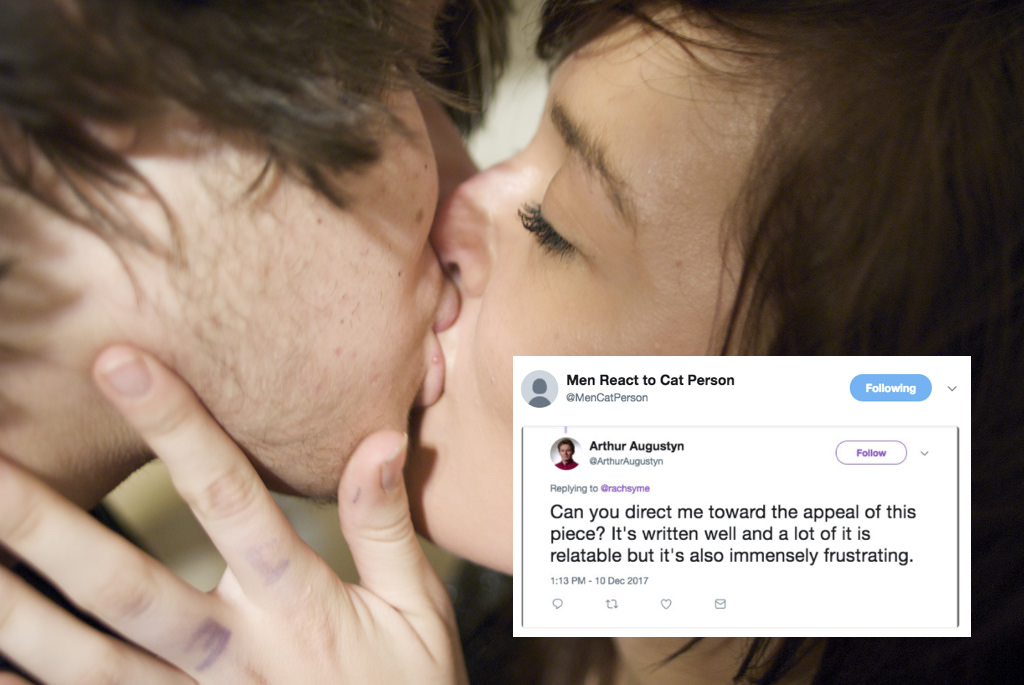Roundtable: What Do You Think Of The New Yorker’s Viral Short Story ‘Cat Person’?
Let's unpack the hype and the criticism.

The internet has been set on fire today over a short story in The New Yorker… Yep, really!
If you haven’t read it already (what have you been doing?), ‘Cat Person’ — written by Kristen Roupenian — follows a romantic encounter between a 20-year-old uni student and a 34-year-old man she meets at her part-time job. They flirt, then go on a date, then have disappointing sex, then awkwardly part ways. Nothing special, sure. But that’s the point. The story is told in painstaking detail, revealing each moment of discomfort and intrigue and uncertainty and paranoia felt by the young woman.
It’s being praised by many women as intensely, horrifically relatable. It’s also being criticised as somewhat shallow or offensive. We asked some Junkee regulars to share their thoughts on both the story and the incredible reception it’s received:
“It was a terrible kiss, shockingly bad; Margot had trouble believing that a grown man could possibly be so bad at kissing.” https://t.co/ZlDmvL0Qax pic.twitter.com/etAEEJ7L8p
— The New Yorker (@NewYorker) December 10, 2017
Nayuka Gorrie
‘Cat Person’ was hard to read not because of its prose, but because of its relatability. The texting, the jokes, the surface level interactions that continue for weeks… Anyone who’s ever developed a pen pal through Tinder would be familiar with this.
This relatability also accounts for its popularity. In a post-Weinstein swamp drain we have our eyes fixed on powerful men waiting for the next one to crumble as story after story emerges. For many people though, it is not the powerful man in a suit or behind the camera, it is also the Robert. Don’t offend Robert. Coddle Robert’s insecurities. Try to find him endearing.
Sex with Robert was like most of the white men I’ve had sex with — the sort of sex where the most you can hope for is that it’s quick. The sort of sex where you imagine you are somewhere else and hope they don’t notice that it is impossible to meet his eye because then he would know exactly how repulsed you are.
I did not see myself in the protagonist who is painfully white, but I definitely recognised Robert. I don’t know why, but all of these encounters have been with white men. As I read ‘Cat Person’, I was bracing myself for rape and found myself relieved that in the end she was “just” called a whore. That’s what makes me truly sad.
Rob Stott
I’d seen some of the hype around ‘Cat Person’ over the weekend but had largely ignored it. A lot of people said that I would only truly relate to the story if I was a woman who had ever dated a man while in my 20s. And while I’m not a woman, I have dated men while in my 20s, so I was curious to see where I landed.
I’ve never had to experience the disparity between genders and the way that can play itself out in dating.
I found the story really well-written and incredibly compelling. I think part of the compulsion was in the banality of the story. I’ve had so many romantic partnerships start in similar ways. With flirtatious text messages and in jokes, to that empty feeling in your stomach as you wait for a reply to a text. Even the gross, tongue-heavy kiss of a guy who doesn’t know what he’s doing is all-too-familiar. I’ve also definitely had that moment of questioning my own safety and wondering if the guy whose house I was visiting was just trying to lure me into some sort of trap.
But there were other parts of the story that were unfamiliar to me and I found them very revealing. I’ve never had to experience the disparity between genders and the way that can play itself out in dating. I think gay men relate to sex differently to a lot of straight people, which means I didn’t really identify with the way a single bad sexual experience can linger on a person’s mind for weeks. There were some very revealing passages in ‘Cat Person’.
I’ve seen a lot of criticism of the way Robert was portrayed, which I understand but I don’t think I fully agree with. This was a piece of fiction, and good fiction should really speak to the reader’s heart. If the number of women I’ve seen in my social media feeds posting the link to ‘Cat Person’ with the word “same” is any indication, I think Roupenian succeeded.
Meg Watson
It’s kind of sad that this is such a Cultural Moment — this straight-forward story about something so many of us have experienced. How have we not already put it into these words? ‘Cat Person’ is the story of that sloppy and empty kiss that you felt compelled into because the guy was ‘nice’; the moment a flirty facade slips into something more confusing; the questions you ask yourself before, during and after.
For me, this story elucidates a lot of things I’ve been talking about over the last few weeks with friends. It’s a head-first dive into the lives of women who didn’t feel ‘worthy’ enough to share their own #MeToo story. It wades around in the sludgy grey waters of power and politeness and consent — the ones men so often inhabit with their eyes closed.
As with all pieces of art, there are criticisms (flying at hyper-speed as the piece goes viral). People have taken issue with the writing style, the way fat bodies are spoken of, the worth of the story itself. I think it’s ultimately up to individual readers to decide on each. But personally, I think it’s apt that the story has elements of naivety or simplicity.
This is the story of a 20-year-old woman. When I was 20, I was naive, I was thinking in somewhat simple ways, and I knew a fair few Roberts. The tragedy is that, as so many women relate to Margot, accepting and interrogating all her flaws, the Roberts will probably never really see themselves.
What if I just started texting random guys I know the "Cat Person" story from The New Yorker and said, "Dude, I think this is based on you!" Would really shake up Sunday Morning.
— Jake Fogelnest (@jakefogelnest) December 10, 2017
Patrick Lenton
I truly thought the man in this story was going to end up as several cats in a trench coat, or like, controlled by that parasite that gets into cat’s brains? But, no spoilers, he isn’t.

‘Cat Person’ is instead a super compelling and well written short story. You can tell that it’s effective due to the depth of personal response from people. Though the story may not be meant for me, it still has a power to it; allowing me the tiniest glimpse into the world of a young woman who is dating a creepy, passive-aggressive dude.
But mostly, I can’t believe we’re talking about short stories as if they’re relevant? What is this, the 1800s? This is the absolute best. Is steam going to make a massive resurgence too? Not to devalue the effectiveness of this story as a work of fiction, but it could be that some of its popularity comes from its similarities with a personal essay; people are reading and responding to it in a completely different way than they would normally treat a short story.
fiction is distinguished from nonfiction for a reason, & we continuously frame it as such. we use fiction to say certain things about the world, and it allows for devices like unreliable narration, which don't fly in a personal essay. the collapse of that is… distressing!
— lαrissα phαm (@lrsphm) December 10, 2017
Osman Faruqi
I read ‘Cat Person’ just before it really blew up online, which meant I was able to judge it on its own merits instead of weighing up whether it lived up to the huge amount of hype it’s received more recently.
Even though I don’t read many fictional short stories, I found the narrative gripping and intensely evocative. I’m not a woman so obviously I can’t say I found the story “relateable” but so many of the situations described in it gelled with stories I’d heard, which made me think it was describing a near universal experience within our generation.
That feeling was strengthened when I saw friends begin to share it on social media with comments like “This is what we’re talking about” and “Read this if you want to ‘get it’”.
I know some people found the ending underwhelming or predictable, but I don’t think the conclusion was supposed to be the most impactful part of the story. The bits I found the most interesting and powerful were the descriptions of Margot’s ‘benign’ interactions with Robert, like when they were hanging out alone, driving and on dates.
Roupenian just seemed to capture that uneven power dynamic so well. It’s a dynamic that is constantly at play in relationships, in the workplace and across society. If all the story has achieved is initiating conversations around power relationships between men and women, even implicit ones, then it’s done us all a service.
Cathy Bouris
I went into ‘Cat Person’ with high hopes. All the feminist women I know were sharing it alongside effusive praise, so I knew it was going to be good.
As someone who doesn’t have much dating experience, as soon as I started reading it, I knew I wasn’t going to be able to relate to it the way everyone else had, but that’s okay. It’s fiction! You don’t need to relate to a piece of fiction to enjoy it. Unfortunately, once Roupenian started describing the guy, I felt my stomach drop.
We’re supposed to accept that someone who looks like that is, of course, repulsive and unappealing.
“He was on the heavy side,” she wrote. That’s fine, it’s factual. “The heavy coat hid his belly” didn’t immediately bother me, either. Then they reached his house and Margot recoiled at the sight of his belly — “thick and soft and covered with hair” — as he bent over to tie his shoes. The cumulative effect of the descriptions hit me.
I think that Roupenian used Robert’s appearance as shorthand for his repulsive personality that slowly reveals itself throughout the piece, and I think that’s indicative of lazy writing. It relies on the assumption of everyone accepting that someone who looks like that is, of course, repulsive and unappealing. It made me empathise with Robert in a way I didn’t really want to empathise with a 34-year-old guy who was dating a college sophomore.
For me, the message — the one all my friends took away from the piece — would have been better conveyed if Robert was described as conventionally attractive. Despite so much evidence to the contrary, women are still conditioned to trust conventionally attractive men more than men who aren’t.
Mel Campbell
It’s kind of frustrating to me that this story has blown up to the point where I have to engage with it as a critic, because my initial response to it was strongly personal and hard to articulate.
This story vividly summons something about my own bad encounters that I had always blamed on my own romantic and sexual ineptitude, and locked away in a secret place in me where it seeps out sometimes and makes me say aloud, “Oh god.” It was just so good at evoking the true awfulness of sex. I really related to the feeling of having to talk yourself into an attraction to someone.
I am not about to die on the hill of the craft of this story being wonderful, because I didn’t admire the writing, as such. That said, the writing reminded me of the way our thoughts unspool in our heads. Perhaps what we see as ‘good writing’ is the ability to quarantine our writing from our most instinctive and least pleasant impulses, which is why we associate garrulous, confessional, digressive writing with young people… and often with young women.
It matters to me that this story shows a woman’s perspective. It reminds me of a tweet I saw a while back:
once in a fiction workshop my professor critiqued a scene because "women wouldn't ask about a hookup's performance in bed" and a girl replied "that's literally the first thing you talk about" and the way he said "oh" will stay with me til i die
— jingle bellison ❄️?? (@girlinabasement) November 28, 2017
I identified with Margot because I could see her thought processes. She tries to deal honestly with Robert, but is trapped: by her own anxieties and inexperience, by the codes of social rituals and politeness, and by the collaborative fantasies of the media she uses to communicate. This story is about how easy it is not to be ‘seen’ or ‘heard’, even when making yourself supposedly vulnerable to another person.
–
Feature image: Wikicommons.
